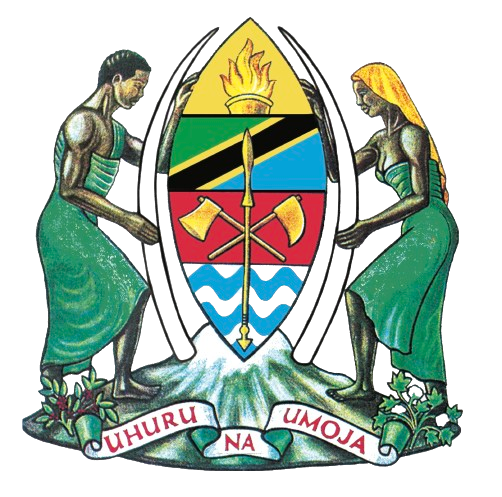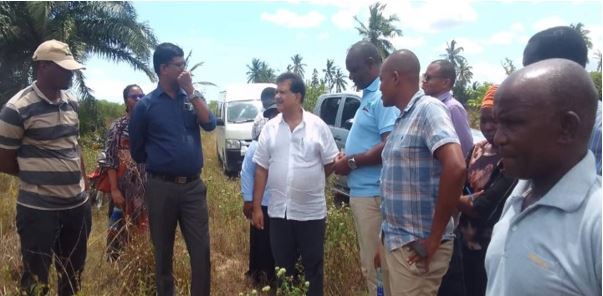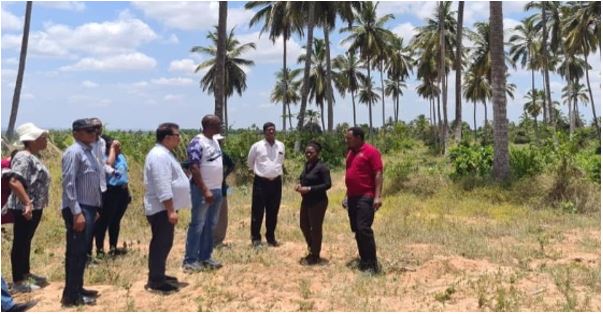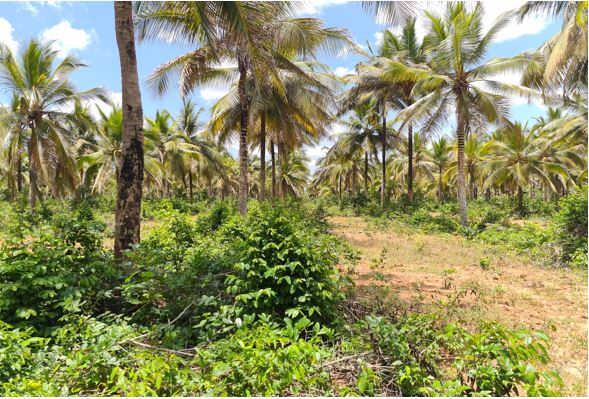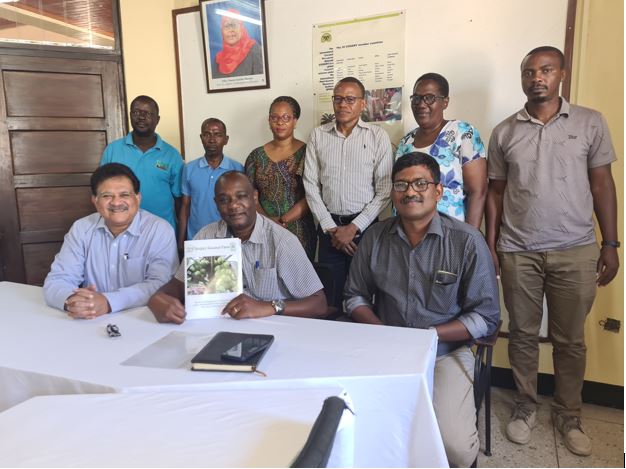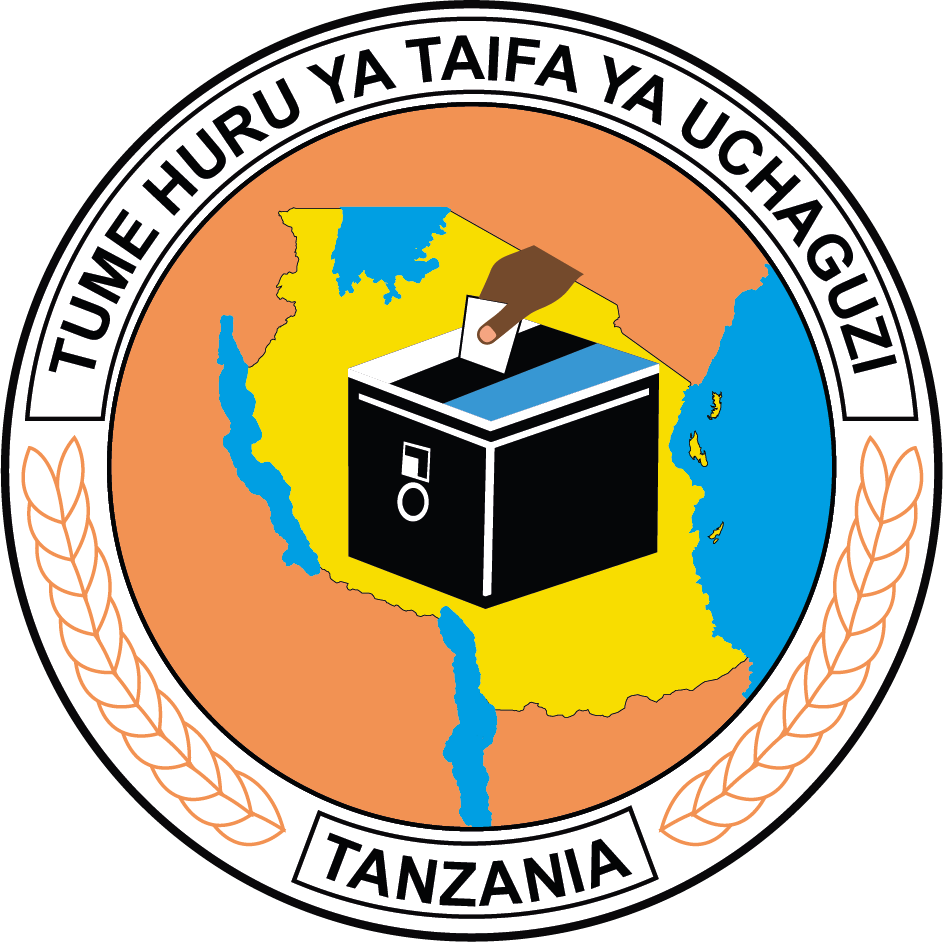Two scientists, Mr. Saibal K. De (seated left) and Mr. John Magesh (seated right) from Deejay Group in India when they visited TARI Mikocheni for collaboration mission on Hybrid Coconut Research.
- 6th November, 2023 13:31
- By CHONA.MAHUSHI
- News
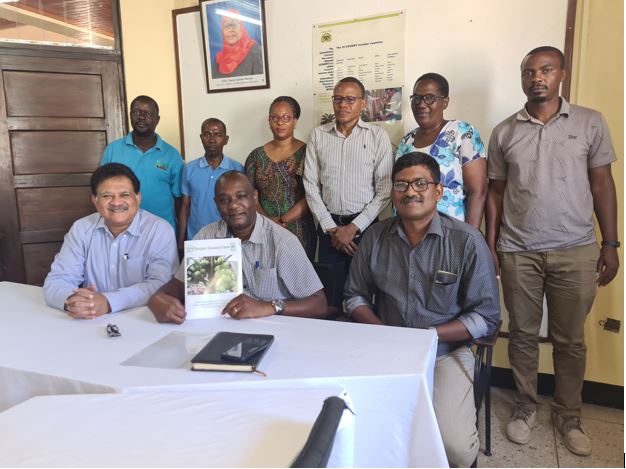
1.
Introduction
A team of two scientist from India, Bengalure (Deejay Coconut farm) visited the Tanzania Agricultural Research Institute (TARI-Mikocheni), including the sub-stations (Mkuranga and Chambezi) from 18th -20th, October 2023.The purpose of the visit was to find out the possibility of collaborating on improved hybrid coconut seed nuts and seedlings production. This is due to low productivity, late maturity period, prolonged drought, disease and pests that are affecting the existing EAT varieties in the country. Coconut hybrid seedlings from Deejay farm are characterized by early maturity i.e., flowering from the 3rd year after transplanting, produces 250 to 300 mature nuts per palm/year. Hence hybrid coconut palms has the potential to contribute to oil production as the country struggle to reduce oil imports and alleviate poverty for smallholder farmers. TARI-Mikocheni management team welcomed the guests since their arrival and later they went together to visit the existing coconut fields at Chambezi and Mkuranga sub-stations.
Two scientists from Deejay Group in India, Centre Manager and other TARI Mikocheni staffs during the visit at Chambezi Sub-station.
Two scientists from Deejay Group in India, Centre Manager and other TARI Mikocheni staffs during the visit at Mkuranga Sub-station.
1. Activities Covered During the Field Visits
The Deejay team with TARI-Mikocheni Management team visited Chambezi and Mkuranga coconut trial sites i.e., the EAT seed farm, germplasm, BTM’s, MLVT and the seedling nursery. The objective was to see the current situation of the coconut trial sites and generally it was observed that inadequate access to improved planting materials, poor management of coconut fields (Poor husbandry practices) coupled with Lethal Disease, pests and drought that have accelerated to reduced number of coconut palms in both Chambezi and Mkuranga sub-stations.
After field visit the two teams were able to identify the opportunities to revamp coconut sub-sector in Tanzania. Among the foremost opportunities identified were:-
· Availability of potential land for coconut production- this will allow to map three areas that Deejay suggested in order to put coconut hybrid seed garden nursery apart from the TARI Mikocheni nursery. These areas will allow to get the list of farmers who will be taken aboard on revamping the coconut production in the country
· Availability of technologies for coconut farming awaiting for dissemination to end users
Appearance of coconut farm at Mkuranga sub-station
Also
the team proposed solutions to address the mentioned challenges affecting
coconut subsector in Tanzania as follows:-
·
Establishment of the
coconut hybrid seed garden nursery about 50 acres that will be able to produce
100,000+ hybrid seedlings from year 5-6 onwards. This is an important step
towards enhancing Coconut hybrid seedlings production that will be available
for farmers within and outside the country
·
Installation of Irrigation
system, it was proposed to drill
boreholes in order to provide water for irrigation of coconut seedlings
·
Fertilizers application
as an important agronomic package that will enhance coconut growth and health
·
Provision of training
programs for management of the coconut palms through exchange visits between
TARI-Mikocheni staff and Deejay team. Also Deejay Team to train TARI Mikocheni
on different technology transfer pathways among them and the most important one
is to build the Application to allow coconut farmers to have an avenue to ask
questions, get different information and solutions on coconut production,
weather and any information pertaining coconut production and agricultural in
general
· Field sanitation and other Good Agronomic Practice (GAPS) are important for the nourishment of coconut palms as it increases the plant vigor to fight against diseases and pests
A formal Memorandum of Understanding
(MOU) between the Deejay of India of India and Tanzania Agricultural Research
Institute (TARI) of the United Republic of Tanzania is required to implement
the above proposals to assist in the development of the coconut industry in
Tanzania. It is suggested to include the following broad areas of cooperation
in the MOU:
·
Cooperation in coconut
research and development
·
Exchange of scientist on
coconut research and technology
·
Professional training
and capacity building in
coconut production and
pest management technologies
·
Exchange of scientific
and technical information on coconut production, processing and value addition
·
Training in technology
dissemination especially the area of App developing
· Other forms of cooperation as mutually agreed by both parties, which facilitate the objectives envisaged for the purpose of this Memorandum
Two scientists, Mr.
Saibal K. De (seated left) and
Mr. John
Magesh (seated right) from
Deejay Company in India when they visited TARI Mikocheni for collaboration
mission on Hybrid Coconut Research.
